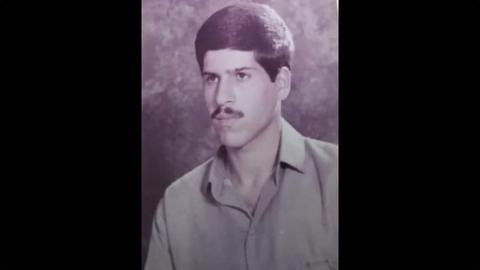Akbar Faraji is a political prisoner being held in Greater Tehran Penitentiary, commonly known as Fashafuyeh (Fashafouyeh). Arrested in January 2019 over a handful of social media posts, he told IranWire he was tricked by interrogators into incriminating himself.
Faraji, who was born in 1981 and is a resident of Baqershahr in Shahr-e Rey, Tehran province, was abruptly detained on the streets by the Revolutionary Guards after venturing out one winter’s day to meet up with a stranger.
“I was introduced to an ordinary person by a friend, and they insisted on meeting me," he said. "I hadn’t yet seen him [in person]. Later, I found out that he too had been arrested, and wanted to lessen his sentence by exposing me."
On being arrested, Faraji was hauled into a Guards-run intelligence detention center and held there before being transferred to Evin Prison on February 20. Four days later, he was released on paying a 13 million toman (US$590) bail.
Then in March 2019, he was summoned to Branch 26 of the Tehran Revolutionary Court and sentenced to six years in prison on charges of "propaganda against the regime" and "conspiracy against national security," of which he was to serve a minimum of five. The shellshocked Faraji was told his social media activities were part of the case against him – together with a confession that he had made under duress, thinking it would set him free.
Threats and Deception Led to ‘Incriminating’ Admission
Faraji was summoned to begin his sentence at Greater Tehran Penitentiary in August 2020, after the first wave of coronavirus infections subsided in Iran. Speaking from the prison, he told IranWire that the court ruling against him was based on a quasi-confession he had given to the Revolutionary Guards.
"The interrogator, through deception, and the officer, by threatening me, made me sign the confession,” he said. “They told me that if I signed this written commitment, I’d be released. But after I did so I was sentenced to five years in prison.
“All I confessed to was ‘writing slogans’. I told them I wasn’t connected to any [political] association and I hadn’t colluded with anyone."
Faraji said he was also not offered so much as a judiciary-appointed lawyer in the court case, and was informed that as a political prisoner, he did not have the right to hire his own. After the sentence he enlisted the help of a private lawyer but his request for a commutation of his sentence was flung out by Branch 36 of the court.
Family Frantic as Principal Carer Grows Weak in Prison
Now stuck behind bars, Faraji has so far not been granted leave to visit his family. "I’m the sole carer for my elderly mother, who is over 80 years old," he said. "She has no income and my family can’t afford to support the two of us.
“My mother has heart problems and asthma. She doesn’t even know I am in prison; she wouldn’t be able to tolerate it. Our family told her I had gone to Turkey for work."
Speaking to IranWire on the condition of anonymity, a member of the Faraji family told IranWire that they were worried about his physical health behind bars. “Akbar is not in a good physical state. He recently underwent shoulder surgery in prison and doctors have said he’ll no longer be able to do much with that shoulder, without difficulty. One of his eyes also has cataracts and he’s not being allowed to have surgery."
Akbar Faraji told Iranwire the shoulder injury was due to an accident in prison, and he now has a metal splint in his hand as a result. The cataracts, meanwhile, are causing him pain. "They know I need eye surgery but they aren’t doing anything about it.”
Faced with a dearth of options, Akbar Faraji’s family is now trying to find a lawyer to push for his inexplicable “conspiracy against national security” conviction to be overturned. His story is one of thousands of similar tales, in which ordinary Iranian citizens have been forced to incriminate themselves for the most innocuous of behavior, then cruelly – and illegally – neglected behind bars.
Related coverage:
Father-of-Two Killed by Medical Negligence in Tehran Prison
Young Political Prisoner's Life Hangs in the Balance in Tehran
Drugs Fed to Jailed Protesters to Control Them
Journalist Ruhollah Zam Executed in Iran
Tortured and at Risk of Execution for Taking Part in 2018 Protests
visit the accountability section
In this section of Iran Wire, you can contact the officials and launch your campaign for various problems


























comments